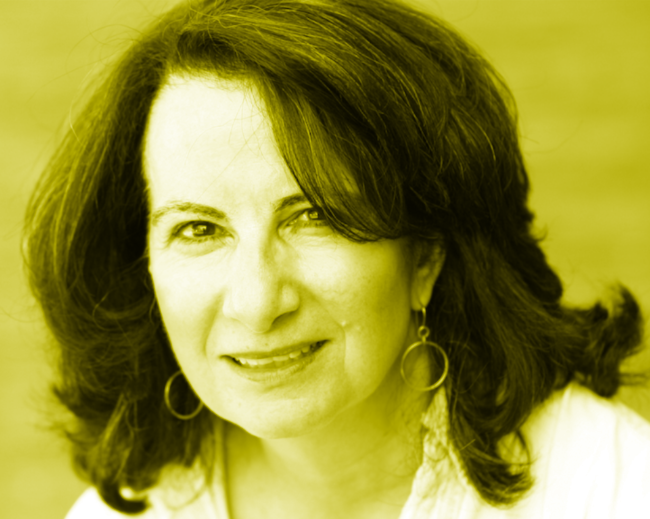“Men I Hate: The Stasi Men,” by Lynette D’Amico (Fiction ’13)
Lynette D’Amico, a 2013 fiction graduate, was recently featured in Guernica. Read an excerpt of D’Amico’s essay below:

Men I Hate: The Stasi Men
All the dogs in Berlin had the same face. A wiry, bearded face with intelligent eyes and perked ears. None of the dogs paid me the slightest bit of attention even though I was so dog hungry, missing our Labradoodle and yellow Lab back home in Boston. The German dogs trotted with purpose and never veered from the path to chase a duck or leap into the water or bark to say hi or keep away. This is what it means to be a good dog in Berlin.
It was 2018 and my husband and I were living in Berlin, where he was on an academic fellowship and I was there as “spouse of.” My position relegated me to the outer circle of the big-headed fellows, which was fine with me. It was part of the story of our relationship—he was a front guy, I preferred to watch the scene around me. We were also there to try and put our marriage back together following my husband’s gender transition from a queer woman to a man, which began two years earlier, in 2016. How would it be to live someplace where nobody knew our specific relationship history or had known us in a previous incarnation as a queer couple? Were we still a queer couple? The hope was that in a setting where somebody was cooking and cleaning for us, we would stop fighting about whose turn it was to vacuum and what’s for dinner and get to the big fights, such as, were we going to stay married?
We were living in Wannsee, a southwestern suburb of Berlin, on the River Havel. While there, I visited the late summer garden at the Liebermann-Villa, the summer residence of the painter Max Liebermann, on a tour with a cohort of fellows. A small birch allée leads to Lake Wannsee and features prominently in many of Liebermann’s paintings. There is a bronze otter fountain, purple cabbages planted among the dahlias, a rose arbor. It is an artist’s garden, with vivid colors and crafted views. After Liebermann died in 1935, the house was confiscated by the Nazis. I wandered nearly next door to the House of the Wannsee Conference, an imposing villa that now operates as a museum, where, in 1942, in an eighty-five-minute meeting, fifteen men decided “the final solution to the Jewish question,” and then were served lunch and drank cognac.
* * *
At the Table
At the obligatory group dinner every night, a dreamy Italian German waiter pulled out the chairs for all the women and poured endless glasses of wine with his hand over his heart. I felt lit up in the spotlight of his beautiful service. He was soft-spoken and had a delicious accent. He greeted me with warmth and eagerness, anticipated my needs, and spoke to me as though he were kissing my hand. He was my favorite. My husband sat with his elbows on the table, chatting up his fellow fellows about digital philosophy and Balkan politics and the fifteenth-century Ottoman empire.
“To reduce a gender transition to being in the wrong flesh bag in my experience is problematic…”
“If the condemned recanted, the person was strangled before the fire was lit—a mercy execution.”
“…neoliberalism is about the individual, not the group!”
My husband was the first trans person to be selected as a fellow for this program, to sit at this table. His award had been publicized, which mostly preempted the need for him to introduce himself as trans, which he had no hesitation about doing. It did happen, more than once, though, that when he described living as a “white, Midwestern girl from a small town in Indiana for fifty years,” an audience member didn’t recognize the signifier—the bearded, burly guy in the designer glasses—as the signified. “Who was the middle-aged woman from Indiana you were talking about?” he was asked.
* * *
The Questions We Carried
There were two single women among the fellows. When I wanted to get my girl on, we sneaked cigarettes and complimented each other’s wardrobe selections. “I love your shoes!” “I love your shoes!” My husband called them my lesbian girlfriends. They were my favorites.
My husband liked to dress in streetwear and overpriced sneakers. He was peppy and happy and filled with joy. Before the transition, he never sweated. In Berlin, he sweat and sweat like a hairy sweating man. He was proud of his sweat. “Look at this sweat,” he said at the dinner table, happily sweating.
As conversations went on around me, I nodded agreeably left and right, chewing and swallowing my German meaty meat meals—pink boar’s meat ravioli, twice-cooked venison, mussels with fennel and blood oranges, lamb’s lettuce with grape and bacon vinaigrette. If anybody asked me anything directly, I panicked into muteness.
“Your husband says you like to cook; maybe you can take a cooking class during your time in Berlin.”
“Perhaps you are interested in cheese culture?”
“What are the ruins of capitalism?”
Every table conversation felt like an interview for a job I was not going to get.
My husband’s question for me was, could I love a man, specifically, him? I had the same question for myself. I mean, you love the person, not a body, not a gender, and what did it matter after nearly twenty years together? People stay married for all kinds of reasons. My husband and I had a joint bank account. We shared an aesthetic sensibility, except for my disdain for streetwear and sneakers. We were both Italian. We weren’t going to break up, were we?
Read the essay in its entirety here: https://www.guernicamag.com/men-i-hate-the-stasi-men/



